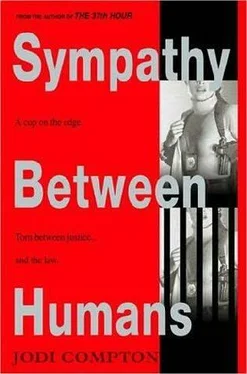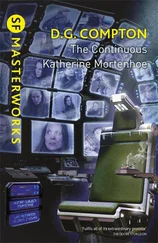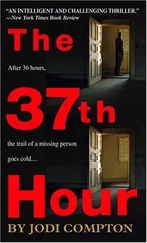“I know that,” I said.
“What I’m suggesting is that if nobody around here is talking about Gray Diaz’s investigation, maybe you shouldn’t be the first to bring it up,” he said.
“I haven’t,” I said.
“On the contrary, you just walked into my office and mentioned it. I didn’t come to you,” he said. “About my decision to send Van Noord to your house: I was mildly troubled by a state of affairs, I acted on it, I satisfied my curiosity. That was the end of it, as far as I was concerned.”
“I didn’t mean to question your judgment, but I need to say one thing. I am not going to sneak out of town in the middle of the night,” I said. “No, what I’m really trying to say is something else.” I swallowed. “I did not kill Royce Stewart.”
“I can’t tell you how happy I am to hear that,” Prewitt said blandly. “Is there anything else?”
“No,” I said. I had a little tremor in my chest from how bluntly I’d just spoken.
“I’ll see you tomorrow, then.”
At the door, I paused and turned back. “There is one other thing,” I said. “That unlicensed physician you asked me to look into? I’ve checked with my informants, and I haven’t been able to track it to a source.” My voice was very casual. “I really don’t think there’s anything to it.”
Last year,after his accident in Blue Earth, my husband had been missing for seven days. I’d exhausted my professional knowledge of missing-persons work in looking for him. I’d traveled and spoken to his family. Furthermore, as his wife, I’d had full access to Shiloh ’s accounts, his papers, his home. None of it had made any difference. It was as if he’d simply been erased.
With Aidan Hennessy, I was in the opposite situation. He should have been easy as hell to find. Aidan was an underage runaway, not a fugitive. The longer he spent on the road, the more likely it should have been that he’d be arrested for vagrancy or petty theft. He simply shouldn’t have been this hard to find.
Yet I’d spent three days working the various law-enforcement databases I had access to, and none of it was helping. Deputy Fredericks had e-mailed me Aidan’s last school-yearbook photo, but that didn’t count as an advance. Unless Aidan Hennessy fell into a drainage canal someplace near where I just happened to be, I didn’t think I was going to find him.
It was that frustration that drove me backward, on my next day off, to the elementary school where all the Hennessy children had received their early education, and which Donal still attended.
Marlinchen had mentioned her fifth-grade teacher, Mrs. Hansen, in a brief phone conversation we’d had earlier that morning. Hansen had taught both Marlinchen and Aidan, although not in the same year, because Aidan had been held back to repeat the fourth grade. By my calculations, that made her the last teacher in Minnesota to be familiar with Aidan Hennessy, and the one most likely to remember him.
The school didn’t look impressive, given the relative wealth of the neighborhood it was in. It was an assortment of one-story redbrick buildings. Children swarmed around the play structures in the yard; it was their lunch recess.
On her lunch break, Mrs. Hansen was grading papers in her classroom. I stepped inside and immediately felt like a giantess as I walked up through the low desks toward the larger one where Mrs. Hansen sat. She was full-breasted for a woman otherwise slightly built- I gauged her at about five-one- and wore glasses on a gold chain over her off-white shell sweater. Her blond hair was shoulder-length, cut in a flattering way close around the face. Only by looking closely could you see she was nearing 50.
“Can I help you?” Hansen said.
“I hope so,” I said. “My name is Sarah Pribek. I’m a detective, and I wanted to talk to you about a runaway I’m looking for.” I laid Marlinchen’s old photo of Aidan on her desk.
Hansen took the photo and raised her eyebrows, then furrowed them in a slightly exaggerated show of scrutiny. “Oh, my goodness, yes,” she said. “Aidan Hennessy. His little brother Donal might have been one of my students last year, but he went to Ms. Campbell instead.” She frowned. “Aidan had a sister, too. I taught her the year before. They were…” Then she broke off.
“They were supposed to advance to your class together,” I finished for her. “They’re twins, but he was held back a year. You’re not revealing anything the family didn’t share with me.”
She nodded affirmation. “That’s correct. What was the girl’s name, again? Something unusual.”
“Marlinchen,” I said.
“He and his sister would be in high school now, correct?”
“She is,” I said. “He’s been a runaway for six months.”
“Oh, my,” Hansen said. “That’s too bad.” She exaggerated her facial expressions, like adults who deal with the young often do, but the feeling underneath seemed genuine.
“You liked him?”
“Yes, I did,” she said. “A sweet boy. Not a lot of self-confidence. Didn’t raise his hand or volunteer answers.” Then she seemed to realign herself behind the desk, as for a formal Q and A with me. “I don’t know how much I can help you. He was my student some time ago. Five years.”
There was no place for me to sit. In nearly every other situation, a person with a desk has a chair on the other side for visitors. Not so with schoolteachers. I leaned back against the nearest student desk and immediately thought better of it as it began to slide away from my weight.
“He’s been living out of state for those five years,” I told her. “You’re the last teacher in this district who would have taught him. I’m just curious about what you remember.”
Hansen frowned apologetically. “Not very much,” she said. “Aidan stands out in my memory mostly because of that missing finger. I used to see it whenever he was writing at his desk, and it always gave me a little bit of a turn.”
“You must remember something more,” I encouraged her. “You said you liked him.”
Hansen played with the glasses on her chain. “Sometimes you get a”- she waffled a hand in the air-“a feeling from students. Aidan seemed old beyond his years, but that might have been because he was older than his classmates, at least when I had him. And taller.” She paused, thinking. “But he seemed ill at ease sometimes, uncomfortable around adults.”
“Do you know why?” I asked.
“He wasn’t the ablest of students; often that erodes children’s self-esteem, particularly in front of grown-ups, who kids see as authority figures who judge them on classroom achievements.” She paused. “Aidan seemed more at ease on the playground. He was athletic and confident.”
“Did he get into fights?” I asked.
Hansen smiled. “Yes, he did. Aidan was very protective of his sister and two younger brothers. Particularly the one who was bookish.”
“Liam,” I said.
“Yes, Liam. He was a mark for bullies. Aidan crossed paths with some of them.” She paused. “I should say that Aidan probably fought on his own behalf, too; he wasn’t a saint. But he wasn’t… I don’t remember him as hostile. I find it impossible to like the bullies, and I liked Aidan.”
I nodded. “Were there behavior problems beyond fighting?”
She considered. “He didn’t always do his homework.”
“He’d forget?” I asked.
Hansen shook her head. “I think he just couldn’t grasp some of the material,” she said. “As I said, he wasn’t the best of students.”
“Neither was I,” I said, smiling wryly. “Thanks for your time.”
***
After work,I drove out to the Hennessy house. Marlinchen was out front when I arrived, standing astride a bicycle. She waved when she heard me approach.
Читать дальше












